- Home
- John Jakes
The Seekers Page 18
The Seekers Read online
Page 18
For the first time in weeks, Abraham laughed aloud. “By God I think I’ve found the answer, thanks to you.”
Now it was Clapper’s turn to stare into his whiskey cup. “Hope so.”
“You don’t think I have?”
The big storekeeper’s eyes locked on Abraham’s. “I don’t want to discourage you, boy. You need encouragement—”
“But you think we won’t find living here any easier than on the farm?”
“Easier, maybe. Not better. Even this far west, I see a mighty lot o’ people movin’ on, Abraham. Movin’ on for the fifth an’ sixth time—”
“I think Elizabeth can be happy here. I’ve got to believe that, Daniel. The only other choices are to go on west—and she’s not strong enough—or to head home to Boston—and I’m not ready to give up that completely. The settlement will make everything right—”
“Sure.” Clapper nodded. “Forget what I said.”
A hymn thundered by scores of voices drifted from the camp meeting. Clapper squeezed his friend’s shoulder. “What’s true for me ain’t necessarily true for you. Things’ll get a lot better if you move in here. Provided you don’t pickle your liver in the meantime—gimme that cup!”
“No, let’s have one more. To celebrate.”
Abraham poured whiskey to the brim, raised the cup.
“I give you Mr. Abraham Kent, merchant.”
Daniel Clapper raised his own cup but for some reason wouldn’t look Abraham squarely in the eye.
vi
Elizabeth greeted Abraham’s plan with complete agreement and overwhelming enthusiasm. As winter approached, she began taking better care of herself. She watched Jared more attentively; Abraham was busy making frequent trips to the settlement mill. There he had his corn ground, retaining what the family would need during the cold months and selling off the rest.
There were no repetitions of the search for the lost child.
During January and February, Elizabeth kept busy cooking, mending, doing laundry—and teaching Jared how to recognize and pronounce part of the alphabet. Watching his mother print large block letters on a slate, the little boy seemed happier than ever before. He enjoyed trying to say the names of the letters correctly. Elizabeth, surprisingly patient, encouraged him. Before long he had progressed to the letter M.
At least once an evening, Elizabeth’s conversation returned to the forthcoming change in their lives. Abraham was glad. She was affectionate again. Amenable to lovemaking. Several times she clasped him with an ardor that reminded him of the first night she came secretly to his room.
According to the way Abraham figured it, new families should be starting up the Great Miami about the first of April, either to squat or to settle on ground whose deed they held. At the end of February he began thinking about the wording of a notice for the settlement’s public message board. He felt confident that if he could find some squatters with money, he could convince them that buying his prime bottomland was a better investment than occupying free land someone else might eventually claim. Most good river acreage in the district was already taken, and that was in his favor.
The first of April 1801 began to loom as a magic date: the end of their hardships, the start of a new, more rewarding life. Abraham consciously avoided thinking about Clapper’s dour philosophy. For Elizabeth’s sake, he couldn’t permit himself to believe that disillusionment always waited, no matter how far a man roamed, or where he settled.
Occasional traders working their way through the icebound forests brought trickles of news. Congress had at last convened in the district christened Columbia. There, the new capital city was rising, named in honor of the country’s first president.
The unwieldy electoral college system had turned January’s national election into a shambles. Jefferson and Aaron Burr deadlocked in a first-place tie with seventy-three votes each. John Adams, his popularity waning, ran third with sixty-five.
The tie vote threw the contest to the pro-Federalist House of Representatives. After thirty-six ballots and much behind-the-scenes maneuvering, Jefferson was named president in February, with Burr vice president. Whereupon, the traders said, certain devout Federalist ladies in New England buried their Bibles in their gardens, fearing secret agents of the “godless” chief executive would seize and burn them.
The results of the election reached the Great Miami in mid-March, just as the weather turned unusually warm and sunny. Elizabeth took to singing as she worked around the cabin. Abraham too was anticipating the day that symbolized a fresh start for the Kents. Six days before the month ended, the Indians came.
Chapter III
The Burning
i
SHE TOUCHED HIS ARM in the chilly darkness. Her fingers closed, rousing him from the fog of sleep. He felt her homespun nightdress touching his forearm, heard the murmur of the March winds. He heard other sounds he didn’t recognize.
“Abraham—”
Her anxiety brought him upright, knuckling his eyes.
“What—?”
She covered his mouth with her other hand. “Be still and listen! There’s someone outside.”
His mind sorted out sounds: Jared breathing on the small bedstead he had built in the opposite corner, the low of the ox, the thump of a hoof on the side of a stall—perhaps that was Henrietta Knox.
Then, alert and alarmed, he made out a human voice, barely audible.
There was a louder thump, as of someone stumbling against a wall. Two voices overlapped one another; the second was angry.
The ox bellowed. Abraham wiped his upper lip.
“They’re out by the barn,” he said.
“Can you hear what they’re saying?”
“Not clearly. But I don’t think they’re white men.”
Elizabeth covered her face. “Oh God help us—”
“Sssh!”
As quietly as possible, he crawled out of bed. He struggled into his trousers. With the tail of his nightshirt still hanging out, he pulled on his boots. He guessed the time to be dawn. A thin line of light defined the edges of the cabin door.
His heart lubbed loudly in his inner ear. He crept toward his rifle propped against the wall, listening for the intruders. Either the men were being exceptionally quiet now or they were gone—
Another bellow from the ox told him his hope was false. His throat felt parched. He returned to Elizabeth, knelt and whispered, “Whatever you do, don’t wake the boy. And stay inside with the door barred.”
He could just discern the white oval of her face as she leaned close. “You’re not going out there—?”
“Yes, I’d better. Maybe I can frighten them off.”
“But I heard at least two voices!”
“Perhaps all they want is food.”
“You mustn’t go—you’ve only one charge in your rifle—”
“And this.”
He groped a hand toward the puncheon table, found his long-bladed Barlow knife of English steel. He tucked the knife in his right boot.
“I’ll be all right. They’ll probably run as soon as I show myself—a lot of them don’t own rifles or muskets.”
“But some do. I’ve heard people at the settlement say—”
“Don’t raise your voice! I’ve got to See what they’re up to—suppose they take a notion to fire the cabin? I tell you I’ll be all right,” he finished, sounding more certain than he felt.
He patted her hand, stole toward the door. He raised the latchstring slowly to free the bar from its bracket. He inched the plank door open.
“Lock yourself in, Elizabeth.”
He slipped outside.
He leaned against the cabin wall, drawing long, deep gulps of air. The leafless trees looked black and stark against the silver of the eastern horizon. A warbler trilled down by the river. The water purled over stones.
He heard the soft chunk of the bar being lowered back in place. Now he could move. Cautiously, he advanced to the corner of the cabin, then on around.
The chimney jutting from the end of the cabin concealed the barn. He leaned toward the edge of the chimney, risked a glance—
He saw a black rectangle. Someone had opened the barn door. A moment later, a man laughed softly inside.
Questions tumbled through his mind. Were there really only two? How were they armed? He wished for his pistols, hanging on pegs inside. But they were useless, he remembered. He hadn’t loaded or primed them since the last time he fired them—
So it came down to the ball in his rifle, and his long knife. Against whatever the intruders might be carrying.
He decided to wait them out. Running to the barn, a clear target, would be foolish. He leaned his forehead against the chimney logs, listening.
He heard shuffling feet. An occasional word growled in an unfamiliar language. The two animals kept stamping. Time seemed to stretch out as the warbler sang down by the shore.
The light brightened. The outline of the barn became clearer. Suddenly Abraham sucked in a sibilant breath. A man had appeared in the barn door—
An Indian, right enough. Fat and toothless and old. His huge belly stretched his filthy army coat. The coat had been stolen from some other white man, Abraham assumed.
The old Indian trailed an ancient musket from one hand. A bedraggled wild turkey feather stuck up from the greased gray of his braided hair. He waved disgustedly for the benefit of someone still invisible in the barn.
Heart knocking faster than ever, Abraham kept one eye pressed to the chimney corner, hoping the poor light would prevent the Indian from spotting him. A second man lurched outside.
This one was younger, with a hard brown face and eyes like black stones. He wore hide trousers and a shirt. His only visible weapon was a spiked war club.
From the way the younger Indian weaved on his feet, Abraham guessed the pair had stolen whiskey somewhere, and now wanted more. He presumed they were Shawnee or Miami, but he couldn’t be positive. If he were lucky, they might abandon their search and slip away to try their thievery in another place—
The younger one barked words Abraham didn’t understand. He lifted his spiked club, pointed it toward the cabin. The meaning was unmistakable.
The fat one seemed hesitant. He finally shook his head, growled a reply that angered his companion. The younger one started walking—straight toward the jutting chimney where Abraham crouched.
He had to scare them off. But he didn’t dare expend his one rifle ball to do it. He screwed up his nerve, took another deep breath—
Stepped from concealment, the rifle aimed at the breastbone of the younger Indian.
The fat one yelped in surprise. Abraham’s nerve almost crumbled away when a cold smile curved the mouth of the younger one. The Indian was still a little drunk—
Abraham had seldom seen such hateful eyes.
“Meneluh,” the Indian said.
Abraham shook his head to show he didn’t understand. The young brave’s smile vanished.
“Meneluh, meneluh!” A sharp gesture with his spiked club. “Drink!”
Abraham drew in a quick breath. Though the young Indian articulated English with difficulty, at least he understood it; perhaps from encounters with itinerant traders. Certain less than scrupulous white men had discovered a new and profitable market by introducing alcohol among the tribes. Heedless of long-term consequences, such traders were frequent visitors at the Indian villages, supplying rum and whiskey in return for pelts. If the savage had learned bits of English in such meetings, at least Abraham had a chance of communicating. Trying to do that was better than launching into a fight.
Aware of how his legs trembled, he shook his head several times, then said slowly and clearly, “No whiskey.”
The young brave grinned. “Whis-key. Meneluh!”
Abraham shook his head again. “No. No. I do not have any whiskey.” He bobbed the rifle’s muzzle at the trees. “Go. Go into the woods. Get off my land.” He pointed at the ground. “This is mine.” He jabbed his thumb against his chest. “Mine. The Shawnee can only hunt where there are no settlers—”
The scowling Indian clearly didn’t comprehend the last word.
“No white men. White—” Abraham touched his face. The Shawnee continued to scowl. Abraham wasn’t certain whether the next thought would have any meaning. “The treaty says—”
“Trea-ty!” The young Shawnee spat on the ground. Then he pronounced a name Abraham couldn’t decipher.
“What?”
“Panther-Passing-Across. Panther-Passing-Across curses white man’s trea-ty. Curses you!”
“Who—who is the Panther?” Abraham asked, still stunned by the violent reaction.
“Chief. Tecumseh. Other”—a garbled, obviously derogatory word—“smoked calumet with Wayne.” Derisively, he pretended to puff an invisible pipe. “Not Shawanese. Not Tecumseh. This land not his—not yours—not any man’s to—” A hand darted outward. “Trade. Moneto gave to all!”
Another angry arc of the club made Abraham start. The fat old Indian giggled, revealing stumps of teeth in wrinkled gums.
“Moneto made land for all!” the young man repeated. “Cannot be”—again the outward gesture—“given.” He pointed his club at the breaking light in the east. “Can kesathwa be given?” Supple fingers pantomimed falling rain. “Can gimewane be given?” He shook his head. “So land cannot be given. Not by one—not by many!”
The Shawnee began walking forward, sensing Abraham’s gut fear now, and playing on it. He shook his head again, angrily. Then: “Woods people who took Wayne calumet—sat with Wayne”—more unintelligible phrases, savagely spoken and plainly showing what the young brave thought of those Indians who had negotiated with the general—“did not own this.” He stamped the earth. “Moneto’s land. For all. If we want—stay. If we want—go.” A sly smile. “Look there—” The club jabbed toward the cabin. “Whis-key.”
Abraham raised the rifle to his shoulder. “No. I’ll kill you. Do you understand? I’ll kill you.”
The Shawnee understood. Abraham jerked the rifle barrel toward the fields.
“Get away! Get off this—”
He was unprepared for the sudden whipping motion of the brave’s arm. The war club tumbled end over end toward his head. He lunged out of the way, stumbled, fell on his left side as the club struck the chimney logs and bounced away.
The young Shawnee reached the club in three long strides. He raised it over his head with both hands, brought it forward and down, the spike aimed at Abraham’s torso. On the ground, Abraham braced the rifle against his hip and fired.
Inside the cabin, Elizabeth screamed. The ball only slowed the downward arc of the war club. Abraham rolled to the left. The bone spike raked his shoulder—
The club dropped from the Indian’s hand. He seized the chimney logs for support, slowly sank to his knees. The shot had blown away his left eye and part of his cheek.
Vomit rose in Abraham’s throat. The young Shawnee’s trousers darkened as he urinated uncontrollably. On his knees, he moaned and slumped forward against the chimney. As he sagged all the way to the ground, his face left gore and bits of bone on the logs—
Abraham struggled to his feet, pulling his knife in case the fat Indian attacked. Marginally aware of a second voice raised in the cabin—Jared’s—he heard a sound that turned his bowels to water. The rattle of the door latch.
“Abraham?”
Damn it, he’d warned her to stay inside! Always, always, she defied advice, did as she wished—
“Abraham?” she called again. She came running around the corner of the cabin, hair streaming at her shoulders.
“Elizabeth, stay ba—”
The fat Indian’s musket roared.
Abraham was facing his wife. He saw her literally fly backwards as the ball hit.
For a moment he stood numb, his gaze swinging back and forth between Elizabeth and the Indian. His wife lay on her back, a black hole oozing blood onto her right temple. The toothless old man lowered t
he musket as a curl of smoke drifted from the muzzle.
Howling, Abraham ran at the Indian, knife raised. The Indian wheeled and lumbered off around the barn, his grunts of fright trailing behind him.
Abraham pursued him only a dozen steps. Then he halted. Shock set his teeth to chattering. The Barlow knife fell from his fingers. He faced about; faced the sight of Elizabeth sprawled in her nightdress, her mouth open and her eyes too—
He knelt beside her, both palms on her cheeks. He heard Jared’s voice from the cabin doorway. “What’s wrong, Papa? Why is Mama lying there?”
“Go back inside! Close the door!”
Frightened by the wild look of his father’s face, Jared vanished. Abraham rocked back and forth on his knees, rubbing his wife’s face. “Elizabeth. Elizabeth—”
It became sobbing. “Elizabeth, no. No, Elizabeth—”
The brightening dawn only heightened her waxy pallor, accented the color of the blood that flowed down past her eye to her ear, clotting in her fair hair. She had washed her hair to shiny brilliance just last night—
Still kneeling, Abraham cradled her corpse in his arms, speaking her name over and over. The cabin door stood slightly ajar. He never noticed.
Nor did he see the huge eyes of a small boy staring at the blood on his mother’s face.
ii
In the pleasant March sunlight, Abraham walked the four miles downriver with Jared. His step was slow, his expression stony. The boy kept glancing up at his father, but never spoke.
When Abraham had finally carried Elizabeth’s body into the cabin, Jared had repeated his questions. Abraham answered in a dull voice, saying Elizabeth had gone away from them and would not be coming back.
Jared’s face showed his confusion: When Elizabeth’s still form lay before him, how was it possible for her to have left the cabin—?
Then and now, as Abraham and Jared walked, a forbidding expression on the father’s face kept the son from voicing any of the fear and turmoil the morning’s events had produced.

 The Bastard
The Bastard The Furies
The Furies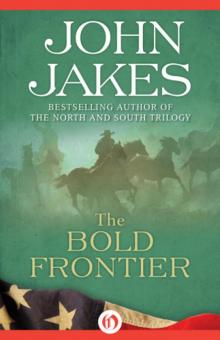 The Bold Frontier
The Bold Frontier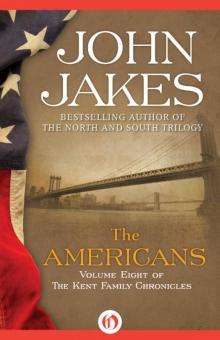 The Americans
The Americans Mention My Name in Atlantis
Mention My Name in Atlantis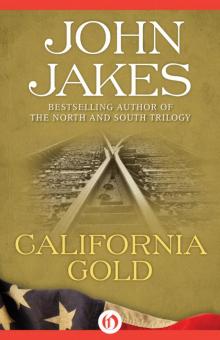 California Gold
California Gold North and South
North and South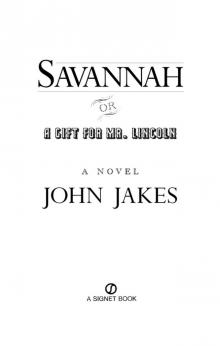 Savannah, or a Gift for Mr. Lincoln
Savannah, or a Gift for Mr. Lincoln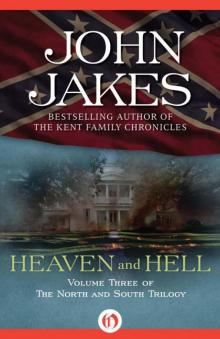 Heaven and Hell
Heaven and Hell Homeland
Homeland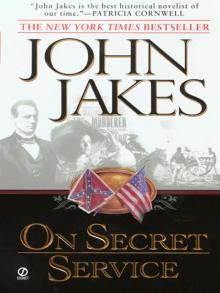 On Secret Service
On Secret Service The Lawless
The Lawless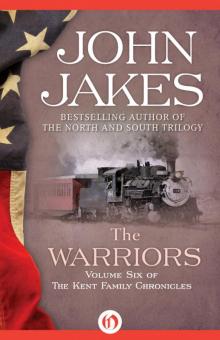 The Titans
The Titans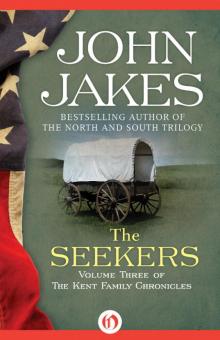 The Seekers
The Seekers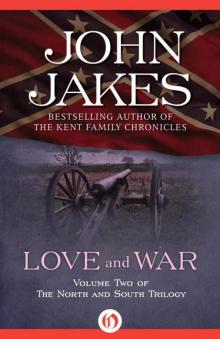 Love and War
Love and War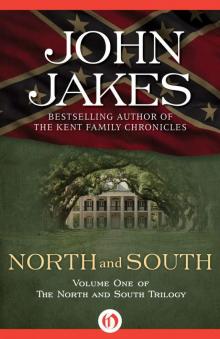 North and South: The North and South Trilogy (Book One)
North and South: The North and South Trilogy (Book One)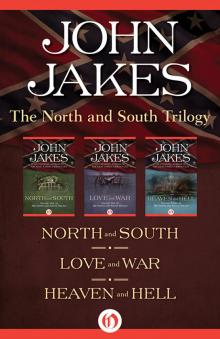 North and South Trilogy
North and South Trilogy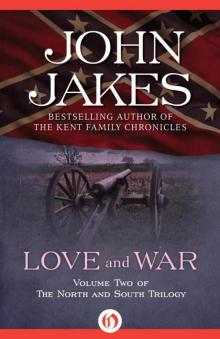 Love and War: The North and South Trilogy
Love and War: The North and South Trilogy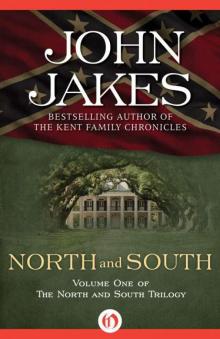 North and South: The North and South Trilogy
North and South: The North and South Trilogy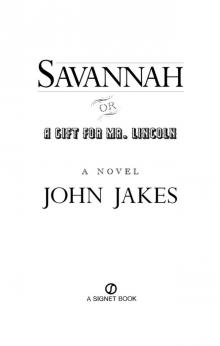 Savannah
Savannah Lawless
Lawless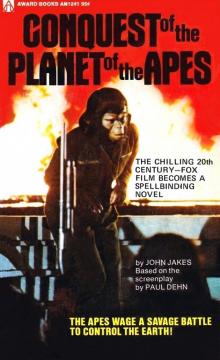 Conquest Of The Planet Of The Apes
Conquest Of The Planet Of The Apes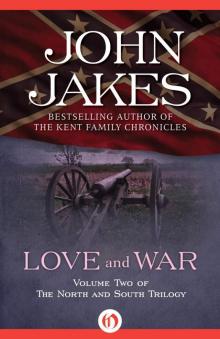 Love and War: The North and South Trilogy (Book Two)
Love and War: The North and South Trilogy (Book Two) The Rebels: The Kent Family Chronicles
The Rebels: The Kent Family Chronicles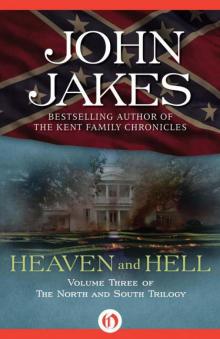 Heaven and Hell: The North and South Trilogy
Heaven and Hell: The North and South Trilogy Planet of the Apes Omnibus 2
Planet of the Apes Omnibus 2 The Bastard: The Kent Family Chronicles
The Bastard: The Kent Family Chronicles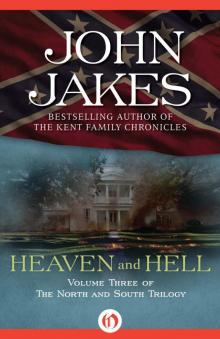 Heaven and Hell: The North and South Trilogy (Book Three)
Heaven and Hell: The North and South Trilogy (Book Three)